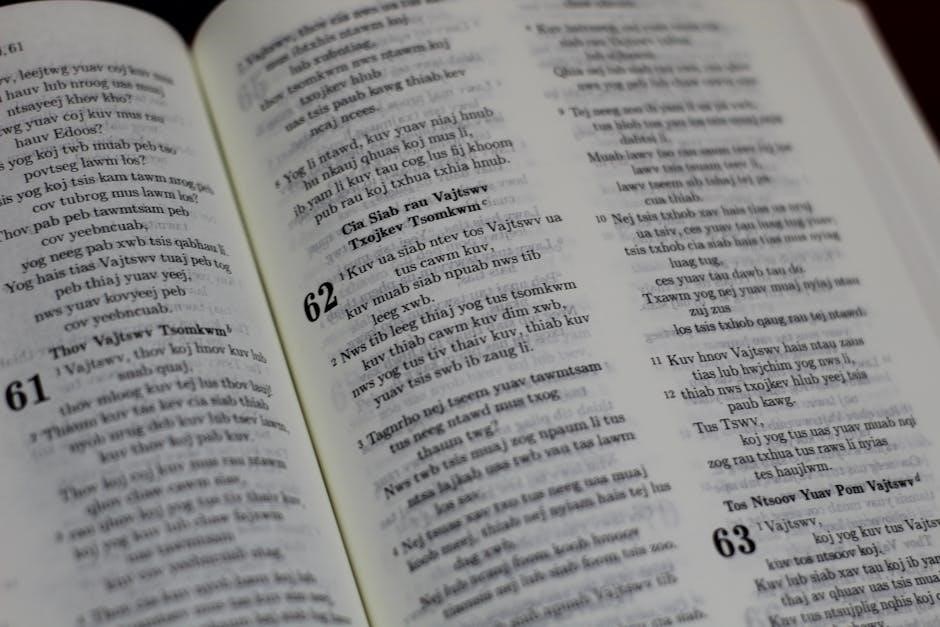This study guide provides an in-depth exploration of C․S․ Lewis’s Mere Christianity, offering insights into its origins, structure, and key theological concepts like the Moral Law and free will․
1․1 Background of C․S․ Lewis and “Mere Christianity”
C․S․ Lewis, a renowned Christian apologist, wrote Mere Christianity during World War II, originally delivering its content as radio broadcasts․ These talks aimed to present the universal truths of Christianity in a straightforward manner, appealing to a broad audience․ Lewis, a former atheist, brought a unique perspective to Christian theology, blending logic, literature, and faith․ The book was later compiled from these broadcasts, offering insights into moral law, the Trinity, and free will․ Its accessible style has made it a cornerstone of Christian literature, inspiring countless readers and forming the foundation of the study guide, which delves deeper into its theological concepts and practical applications․
1․2 Purpose of the Study Guide
The purpose of the Mere Christianity Study Guide is to enhance readers’ understanding of C․S․ Lewis’s seminal work by providing structured analysis and reflection tools․ It offers detailed outlines, discussion questions, and biblical references to deepen engagement with the text․ Designed for both individual and group study, the guide facilitates a comprehensive exploration of Lewis’s arguments for Christian faith․ By breaking down complex theological concepts into accessible sections, it enables learners to grasp key ideas, such as the Moral Law and the Trinity, while encouraging personal application and spiritual growth․ This resource is invaluable for those seeking to integrate Lewis’s insights into their faith journey․
1․3 Key Themes and Concepts
C․S․ Lewis’s Mere Christianity explores foundational Christian themes, including the existence of a universal Moral Law, the nature of humanity, and the concept of free will․ The study guide delves into these ideas, emphasizing their relevance to modern spirituality․ It also examines the Trinity, a central Christian doctrine, and its implications for understanding God’s nature․ Additionally, the guide highlights Lewis’s arguments for the divinity of Christ and the significance of faith in transforming human lives․ These concepts are presented in a logical progression, making the study guide an essential tool for comprehending Lewis’s apologetic approach to Christianity․

Structure of the Book and Study Guide
The study guide mirrors the four-book structure of Mere Christianity, offering detailed discussion questions and biblical references to enhance understanding of Lewis’s theological arguments․
2․1 Overview of the Four Books in “Mere Christianity”
C․S․ Lewis’s Mere Christianity is divided into four books, each addressing distinct theological and philosophical themes․ Book I explores the concept of the Moral Law, arguing its universal presence and divine origin․ Book II delves into the identity of Jesus Christ, examining His claims and the logical implications for Christianity․ Book III discusses Christian morality, outlining ethical principles rooted in faith․ Finally, Book IV addresses the doctrine of the Trinity, offering a rational defense of this central Christian belief․ This structure provides a logical progression, guiding readers from foundational concepts to deeper theological truths․
2․2 How the Study Guide Aligns with the Original Text
The study guide closely aligns with C․S․ Lewis’s original text, offering a structured approach to understanding Mere Christianity․ It mirrors the book’s four-part framework, ensuring each section of the guide corresponds directly to the original content․ Discussion questions and reflection exercises are tailored to specific chapters, helping readers engage deeply with Lewis’s arguments․ The guide also incorporates biblical references and theological insights, maintaining the integrity of Lewis’s teachings while providing additional context for clarity․ This alignment ensures that the study guide serves as a faithful companion to the original work, enhancing comprehension and fostering meaningful discussion․

2․3 Unique Features of the Study Guide
The study guide offers several unique features that enhance the reader’s experience․ It includes detailed summaries of each chapter, providing a concise overview of Lewis’s arguments․ Additionally, the guide incorporates thought-provoking discussion questions designed to stimulate group dialogue and personal reflection․ Unique to this guide are its sections on integrating biblical references, offering a deeper theological context․ Furthermore, it provides historical insights into the context of Lewis’s work, enriching the reader’s understanding․ These features make the study guide an invaluable resource for both individual and group study, ensuring a comprehensive and engaging exploration of Mere Christianity․

Theological Concepts Explored

The study guide delves into key theological ideas such as the Moral Law, the Trinity, and free will, providing a deeper understanding of Christian doctrine and its implications․

3․1 The Moral Law and Its Significance

The Moral Law, as discussed in Mere Christianity, refers to an innate sense of right and wrong shared by humanity․ C․S․ Lewis argues that this universal moral code transcends cultural differences, pointing to a higher authority․ The study guide explores how this concept is foundational to Christian ethics, emphasizing its role in distinguishing good from evil․ By examining real-world examples and biblical references, participants gain insight into the Moral Law’s significance in guiding personal behavior and societal norms, ultimately reflecting God’s nature and will for humanity․

3․2 The Concept of the Trinity
C․S․ Lewis delves into the doctrine of the Trinity, explaining it as three distinct yet unified persons—Father, Son, and Holy Spirit—existing as one God․ The study guide examines Lewis’s analogy of the Trinity as a dance, symbolizing harmony and interdependence․ Through discussion questions and biblical references, participants explore how the Trinity reflects divine relationships and humanity’s creation in God’s image․ This section encourages deeper reflection on the Trinity’s practical implications for faith and understanding God’s nature, fostering a richer theological appreciation and personal connection to the divine․
3․3 Free Will and Its Implications
C․S․ Lewis emphasizes free will as a divine gift, enabling humans to choose between good and evil․ This concept underscores moral responsibility, as individuals must confront the consequences of their choices․ The study guide explores how free will intersects with faith, sin, and redemption, highlighting its significance in Christian theology․ Through discussion questions and biblical references, participants examine how free will reflects God’s trust in humanity and the potential for spiritual growth․ Lewis’s insights challenge readers to consider the profound implications of their decisions, aligning with the study guide’s goal of fostering deeper theological understanding and personal reflection․

Using the Study Guide Effectively
The study guide is most effective in small group settings, fostering meaningful discussions and deeper understanding of Lewis’s insights․ It integrates biblical references and structured outlines to enhance engagement and spiritual growth․
4․1 Benefits of Small Group Study
Small group study offers a collaborative environment for deeper engagement with Mere Christianity․ It fosters meaningful discussions, allowing participants to share insights and learn from diverse perspectives․ The structured outlines and discussion questions in the study guide encourage active participation and reflection․ Small groups also promote accountability and mutual support, helping individuals stay committed to their spiritual journey․ The interactive nature of group study enhances understanding of complex theological concepts, making the teachings of C․S․ Lewis more accessible and applicable to everyday life․ This communal approach enriches the learning experience, fostering personal growth and a stronger connection to the principles of Christianity․
4․2 Engaging with Discussion Questions
Engaging with discussion questions in the Mere Christianity Study Guide fosters deeper understanding and reflection on C․S․ Lewis’s teachings․ These questions are designed to stimulate critical thinking and open dialogue, encouraging participants to explore complex theological concepts․ By addressing these questions, individuals can clarify doubts, share personal insights, and gain new perspectives․ The guide’s structured format ensures that discussions remain focused and productive, helping participants apply Lewis’s principles to real-life situations․ This interactive approach enhances learning, making the study of Mere Christianity a transformative experience for individuals and groups alike, while fostering a deeper connection to the text’s core messages․
4․3 Integrating Biblical References
The Mere Christianity Study Guide effectively integrates biblical references to deepen the understanding of C․S․ Lewis’s arguments․ By connecting key theological concepts with scripture, participants can explore how Lewis’s ideas align with Christian teachings․ This approach enriches discussions, providing a solid biblical foundation for exploring themes like morality and free will․ The guide encourages readers to cross-reference Lewis’s insights with relevant passages, fostering a holistic understanding of faith․ This integration not only enhances the study experience but also helps participants apply biblical principles to their lives, making the study guide a valuable resource for spiritual growth and intellectual engagement․

The Impact of “Mere Christianity”
Mere Christianity has profoundly influenced millions, offering timeless insights into faith and morality․ Its historical context, particularly during WWII, underscores its enduring relevance in shaping Christian thought globally․
5․1 Historical Context and Influence
C․S․ Lewis’s Mere Christianity emerged during WWII, offering moral clarity amid global turmoil․ Originally broadcast as radio talks, it resonated deeply with audiences seeking hope and meaning․ The book’s universal themes transcended its historical context, making it a cornerstone of Christian apologetics․ Its influence spans generations, shaping theological discussions and inspiring countless readers․ The study guide enhances this legacy by providing structured reflections, ensuring the book’s relevance in modern educational and spiritual settings․ Lewis’s work remains a vital resource for understanding Christianity’s foundational truths and their application in diverse cultural and temporal contexts․
5․2 Relevance in Modern Christianity
C․S․ Lewis’s Mere Christianity remains profoundly relevant in modern times, addressing universal questions about morality, free will, and the nature of God․ Its timeless insights resonate with contemporary seekers, offering a clear and logical defense of Christian doctrine․ The study guide enhances this relevance by providing structured discussions and reflections, making it accessible to diverse audiences․ In an era marked by moral relativism and secularism, Lewis’s work challenges readers to rethink their understanding of faith and its application in everyday life․ The guide’s focus on key themes ensures that modern Christians can engage deeply with the text, fostering spiritual growth and intellectual clarity in a rapidly changing world․
5․3 Educational Applications
The Mere Christianity Study Guide serves as a valuable educational resource, particularly in religious and philosophical studies․ Its structured format, with discussion questions and biblical references, makes it ideal for classroom use․ The guide helps students unpack complex theological concepts, such as the Trinity and moral law, in an accessible manner․ It is widely used in small group settings, universities, and seminaries to facilitate deeper understanding of Lewis’s arguments․ The guide’s clarity and depth make it a versatile tool for educators seeking to explore Christian doctrine and its relevance in modern contexts․ Its educational applications continue to enrich both individual and group learning experiences worldwide․